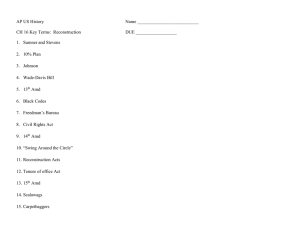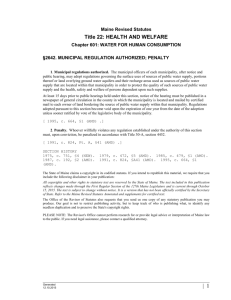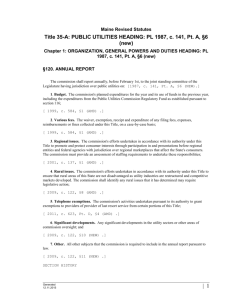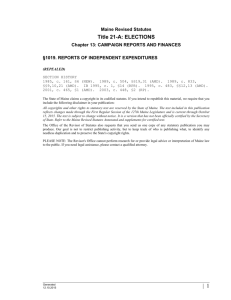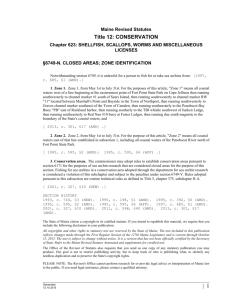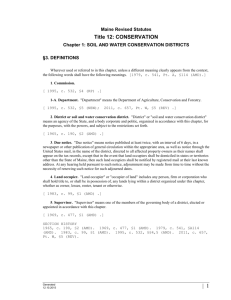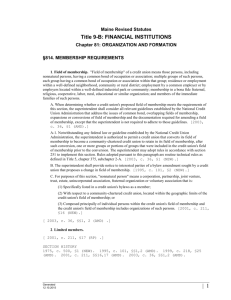ME Rev. Stat. tit.37-B, §181 et seq.doc
advertisement
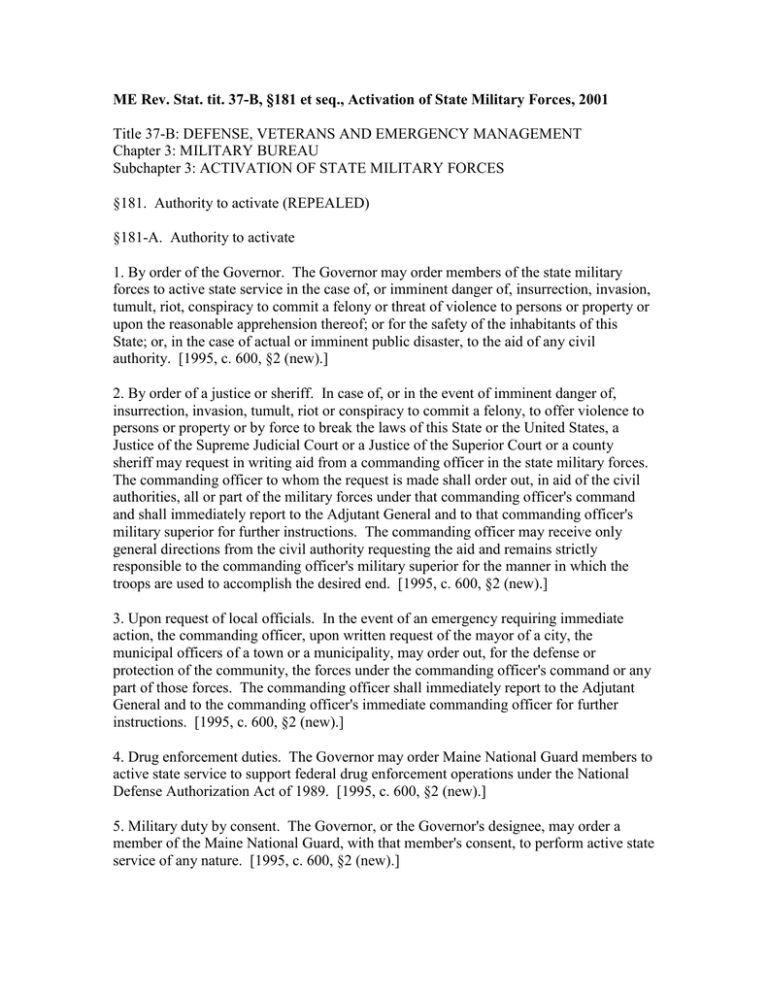
ME Rev. Stat. tit. 37-B, §181 et seq., Activation of State Military Forces, 2001 Title 37-B: DEFENSE, VETERANS AND EMERGENCY MANAGEMENT Chapter 3: MILITARY BUREAU Subchapter 3: ACTIVATION OF STATE MILITARY FORCES §181. Authority to activate (REPEALED) §181-A. Authority to activate 1. By order of the Governor. The Governor may order members of the state military forces to active state service in the case of, or imminent danger of, insurrection, invasion, tumult, riot, conspiracy to commit a felony or threat of violence to persons or property or upon the reasonable apprehension thereof; or for the safety of the inhabitants of this State; or, in the case of actual or imminent public disaster, to the aid of any civil authority. [1995, c. 600, §2 (new).] 2. By order of a justice or sheriff. In case of, or in the event of imminent danger of, insurrection, invasion, tumult, riot or conspiracy to commit a felony, to offer violence to persons or property or by force to break the laws of this State or the United States, a Justice of the Supreme Judicial Court or a Justice of the Superior Court or a county sheriff may request in writing aid from a commanding officer in the state military forces. The commanding officer to whom the request is made shall order out, in aid of the civil authorities, all or part of the military forces under that commanding officer's command and shall immediately report to the Adjutant General and to that commanding officer's military superior for further instructions. The commanding officer may receive only general directions from the civil authority requesting the aid and remains strictly responsible to the commanding officer's military superior for the manner in which the troops are used to accomplish the desired end. [1995, c. 600, §2 (new).] 3. Upon request of local officials. In the event of an emergency requiring immediate action, the commanding officer, upon written request of the mayor of a city, the municipal officers of a town or a municipality, may order out, for the defense or protection of the community, the forces under the commanding officer's command or any part of those forces. The commanding officer shall immediately report to the Adjutant General and to the commanding officer's immediate commanding officer for further instructions. [1995, c. 600, §2 (new).] 4. Drug enforcement duties. The Governor may order Maine National Guard members to active state service to support federal drug enforcement operations under the National Defense Authorization Act of 1989. [1995, c. 600, §2 (new).] 5. Military duty by consent. The Governor, or the Governor's designee, may order a member of the Maine National Guard, with that member's consent, to perform active state service of any nature. [1995, c. 600, §2 (new).] §182. Proclamation of state of insurrection Whenever any portion of the state military forces is activated in aid of civilian authority and if, in the Governor's judgment, the maintenance of law and order will thereby be promoted, the Governor, by proclamation, may declare the county or municipality receiving the assistance, or any specified portion or combination, to be in a state of insurrection. [1995, c. 600, §3 (amd).] In the event of a proclamation of insurrection, and without limiting any other powers of the Governor, whether inherent or conferred by other existing laws, the Governor may issue rules under the emergency rule-making provisions of the Maine Administrative Procedure Act, Title 5, section 8054 that are reasonable under the circumstances to avert additional damage, destruction, injury or loss of life, including, but not limited to, emergency rules for curfews, the deployment of emergency medical supplies and facilities, evacuations, the closing of liquor, arms, ammunition, explosives or other stores and facilities, access roads, temporary detours and other things, whether of a same or a different nature. [1995, c. 600, §3 (amd).] In the event of the call up of military forces, pursuant to section 181-A, subsection 1, and without limiting any powers expressly and inherently possessed by or otherwise vested in the Governor as Commander in Chief, the Governor or Adjutant General, as the Governor's designee, may petition any Superior Court for ex parte temporary restraining orders to restrain unlawful interference with efforts to maintain peace or preserve life and property. The court may grant appropriate temporary relief. Upon issuance of the order, the Governor shall cause prompt notice of the order and its effect to be broadcast, posted, announced or otherwise publicized so as to reach the persons effected. Any person aggrieved by the order is entitled at any time it is in effect to bring a motion for vacating the order. The motion must lie in the court from which the order was issued and the moving parties shall serve notice of the motion upon the Governor concurrent with it being filed, but, until vacated, the order remains effective according to its terms. [1995, c. 600, §3 (amd).] §183. Human health emergencies Personnel and equipment of the Maine National Guard may be employed in the case of human health emergencies. [1995, c. 600, §4 (amd).] 1. Activation of Maine National Guard. In the event of illness, injury, missing persons or loss of life, creating an emergency that requires specialized personnel or equipment of the Maine National Guard to prevent human suffering, increased health risk or loss of life, the Governor or the Governor's designee may order into active state service the necessary personnel and equipment of the Maine National Guard. Human health emergencies may include medical evacuation and search and rescue under Title 6, section 303 and Title 12, section 7035, which may include providing emergency helicopter airlift service. Any person ordered into active state service, for the purposes of this subsection, is considered a state employee for purposes of the Maine Tort Claims Act and that person's liability is limited by that Act. [1995, c. 600, §4 (amd).] 2. Immunity from civil liability. In addition to all existing tort immunities enumerated in the Maine Tort Claims Act any person ordered into active state service, for the purposes of this section, is immune from civil liability for damages to the same extent as any person who renders assistance pursuant to Title 14, section 164. [1995, c. 600, §4 (amd).] 3. Accounting. At least 30 days before the end of each fiscal year, the Adjutant General shall prepare an accounting of all expenses incurred pursuant to this section since any prior accounting and shall present this accounting to the Commissioner of Human Services for payment. [1995, c. 600, §4 (amd).] 4. Reimbursement. [1995, c. 600, §4 (rp).] §184. Notice for duty Notices for military duty must be given as follows. [1995, c. 600, §5 (amd).] 1. When given. Members of the state military forces must receive reasonable prior notice of active state service appropriate to the duty to be performed. [1995, c. 600, §5 (amd).] 2. How given. Notices may be given orally or in writing. Orders conspicuously posted during a regular meeting of the unit, not less than 4 days prior to the date fixed in the order, are sufficient. [1995, c. 600, §5 (amd).] 3. Dates fixed by law. When drill dates have been fixed by law, orders or regulations, no further notice is required. [1995, c. 600, §5 (amd).] §185. Rights and liabilities of military force members 1. Immunity from civil and criminal liability. A member of the state military forces may not be liable civilly or criminally for any act done or caused, ordered or directed to be done by that member while on active state service in the performance of that member's duty. If an action of any nature has been commenced in any court by any person against an officer or enlisted member of the state military forces for such an act, done or caused, ordered or directed to be done, all expenses of the defense of the action, including fees of witnesses for the defense, defendant's court costs, and all costs for transcripts of records and abstract thereof on appeal, must be paid by the State out of the Military Fund. When the action is civil, it is the duty of the Attorney General to defend that officer or enlisted member. When the action is criminal, the Adjutant General shall designate a judge advocate of the National Guard or other authorized state military or naval force to conduct the defense of the member. If the services of a judge advocate are not available, the Adjutant General shall select some other competent attorney to conduct the defense. In any civil action, the defendant may require the person instituting the action to file security for payment of costs that may be awarded the defendant, which costs, if paid out of the Military Fund, when received, must be paid into the State Treasury and credited to the Military Fund. [1995, c. 196, Pt. B, §2 (amd).] 2. Exemption from arrest. Persons belonging to the state military forces are exempt from arrest as follows. 2. Exemption from arrest. A. Every person belonging to the state military forces, in all cases except a crime punishable by a maximum term of imprisonment equal to or exceeding one year or breach of the peace, is privileged from arrest while going to, attending or returning from active state service or federal military duty. [2001, c. 662, §22 (amd).] B. On the day of any active state service or federal military duty, no officer or enlisted member may be arrested in a civil action or mesne process, or on a warrant for taxes; nor may that person be arrested on the day of annual Thanksgiving; Patriots' Day; Memorial Day; July 4th; Labor Day; Veterans' Day, November 11th; or Christmas. [2001, c. 662, §22 (amd).] [2001, c. 662, §22 (amd).] 3. Exemption from jury duty. Every member of the state military forces, while going to, attending or returning from active state service or federal military duty, is exempt from jury duty. Production of a certificate from the claimant's commanding officer that the person qualifies for the exemption is prima facie proof that the person is entitled to the exemption. [2001, c. 662, §22 (amd).] 4. Rights of a law enforcement officer. A commissioned officer of the state military forces when called to active state service under section 181-A, subsection 1, in addition to such other rights conferred by this chapter and otherwise by law, has the rights, authority and immunities of a law enforcement officer. [2001, c. 662, §23 (amd).] §186. Injuries sustained in connection with military duty 1. Compensation as state employee. A member of the state military forces receives compensation as a state employee according to the provisions of Title 39-A and this section. 1. Compensation as state employee. A. Duty status is as follows. (1) The types of duty that are covered are: (a) Active state service as defined by section 101-A, whether performed with or without compensation. (2) The types of duty that are not covered are: (d) Federal technician civilian duty under the United States Code, Title 32, Section 709; and (e) Military duty performed pursuant to the United States Code, Title 10. [2001, c. 662, §24 (amd).] B. Types of injuries cognizable are as follows: (1) The injury, disability or disease must have been received, incurred or contracted while in active state service; (2) Service members must be under the control and supervision of the military. Incidents occurring during periods of leave or pass are not compensable; and (3) An injury, disability or disease received not incident to duty or contracted with willful negligence or misconduct is not compensable. [2001, c. 662, §24 (amd).] C. Preconditions for benefits under Title 39-A are as follows: (1) Federal income maintenance benefits must be applied for and, if they exceed comparable Title 39-A benefits, must be exhausted by the member before receiving weekly compensation benefits under Title 39-A. Medical care at military or Veterans' Administration facilities, civilian care paid for by the military forces and other benefits furnished by the military force or the Veterans' Administration, including military programs offered to retrain or occupationally rehabilitate the service member, must be used before entitlement to benefits under Title 39-A. Military programs are fully creditable under Title 39-A in an approved plan of rehabilitation; and (2) Title 39-A benefits are based on inability to perform the service member's usual occupation. [2001, c. 662, §24 (amd).] D. For the purpose of calculation of compensation, average weekly wage must be computed solely on the earning capacity of the injured member in the occupation in which that member is regularly engaged. In case of death, dependents are entitled to compensation as provided in Title 39-A and any amendments to that Title. [2001, c. 662, §24 (amd).] E. If the member is eligible for military or Veterans' Administration care and knowingly declines or through the member's actions forfeits rights to federal care benefits, the member is not entitled to compensation for civilian care under Title 39-A. [2001, c. 662, §24 (amd).] F. All federal benefits received by the member as a result of an injury, disability or disease are considered to be derived from the employer and constitute a setoff to compensation awarded as a result of this section. A dollar-for-dollar setoff is authorized for all benefits to include continuation of federal pay and allowances, incapacitation pay, severance pay, disability retirement pay, Veterans' Administration disability payments and military and Veterans' Administration death benefits. [2001, c. 662, §24 (amd).] G. Reporting pursuant to Title 39-A does not have to be initiated until a final decision is reached on the injured service member's entitlement to federal benefits or while military or veterans' disability benefits are received in lieu of compensation under Title 39-A, whichever ceases first. Veterans' disability benefits provided in this subsection include state military duty pay received under section 143, federal continuation pay or incapacitation pay in lieu of benefits under Title 39-A. The time provisions of Title 39-A commence upon notification to the service member that federal benefits are not authorized, or the gross monetary federal benefits are determined to be less than the entitlements under Title 39-A without taking into account the setoff prescribed in paragraph E. [2001, c. 662, §24 (amd).] [2001, c. 662, §24 (amd).] 2. Average weekly wage; death benefits. [1987, c. 271 (rp).] 3. Setoff. [1987, c. 271 (rp).] 4. Federal pay status. [1987, c. 271 (rp).] §187. Bounds and limits of camps The bounds and limits of camps may be fixed and intrusion within those limits may be restricted as follows. [1983, c. 460, § 3 (new).] 1. Fixing the limits. Every commanding officer on duty may fix necessary bounds and limits to his camp or parade. In doing so, he may not prevent passage along a through road. By order of the Governor, the commanding officer may, as described in subsection 2, restrict use or passage through an extended area not more than 1/2 mile around the camp. The owners of land within that surrounding security area and their agents shall not be prevented from using, occupying or improving their land in the same manner as they were accustomed to do at the time the camp was occupied. [1983, c. 460, § 3 (new).] 2. Confinement of intruders. Any person who intrudes within the fixed limits after being forbidden, or resists a sentinel attempting to put or keep him out of those limits, or disturbs, interrupts or otherwise hinders the passage of troops or the discharge of their duty, may be confined under guard for up to 14 hours at the discretion of the commanding officer. [1983, c. 460, § 3 (new).] 3. Intoxicating beverages. The commanding officer of any camp or armory may prohibit the introduction or sale of any intoxicating beverage within the necessary or extended limits of the camp or armory. [1983, c. 460, § 3 (new).] §188. Closing of stores Whenever any part of the state military forces is activated to state service pursuant to this subchapter, the commanding officer of those troops may order the closing of any place in the area under his control where intoxicating beverages, arms, ammunition or explosives are sold. He may also forbid the exchanging or transfer of those articles for the duration of his troops' assignment to that area whether or not a civil official has issued a comparable order. [1983, c. 460, § 3 (new).] §189. Reemployment rights (REPEALED)
